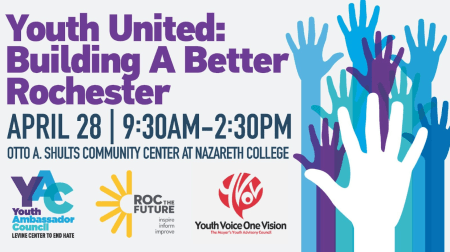
(Photos: Levine Center to End Hate)
As someone who has been organizing in Rochester since the age of 14, Thomas Cuyler knows the dangers of becoming siloed in the competitive atmosphere of social justice work.
“In Rochester, I feel like a lot of not-for-profits are fighting for crumbs. The financial situation creates an environment where it can be very cutthroat,” says Cuyler, the youth engagement coordinator at the Levine Center to End Hate. “That’s why a lot of organizations don’t end up working together.
“When it comes to fundraising or grant writing time, a lot of time you’re going for the same resources, which can create animosity. But collaboration is so important (when) doing this type of work; we have to bring these voices together.”
With that perspective in mind, the collaborative nature of the Levine Center’s latest event, slated for April 28, is already a success to Cuyler. Youth United: Building a Better Rochester was developed by the Levine Center’s Youth Ambassador Council, Youth Voice One Vision (the Mayor’s Youth Advisory Council), and the Youth Leadership Coalition (an initiative of ROC the Future) in partnership with Community Youth Development students at Nazareth College.
“Youth United is an opportunity for youth leaders to collaborate under the principles of collective impact and amplify their voices together. This summit has been intentional from start to finish to focus on the voices and priorities of youth,” says Kilolo Moyo-White, family and community engagement specialist at Roc the Future Alliance.

The half-day event is intended to connect youth throughout Greater Rochester to work toward a larger goal of social change through conversations; hands-on activities; a keynote speech by Frank Williams, vice president for strategic enrollment management at Nazareth College; and a panel discussion with local writer Jessie Cruz.
Subjects include an examination of Black revolutionary strategies from Reconstruction to the Black Lives Matter era, leadership styles, personal branding, creating an action plan in response to violence, and “Changemaker Competencies.”
“I hope we can show students not just how and why it is good to help but also ways to do so,” says Javier Benzan, a youth ambassador at the Levine Center. “For instance, our presentation points to a grant opportunity from the Gandhi Institute for Nonviolence to fund youth-based community projects to address hate. We’re not only showing how to make change but giving people resources for what they need.”
Cuyler says the 20 attending organizations include a diversity of geography and types. Students from public, private, charter and alternative schools are all included in the summit.
He believes events like these, with a variety of attendees, can help overcome differences and create avenues for social change. From his own experience, Cuyler feels society often speaks down to or assumes many issues that are facing young people today.
“I’ve heard a lot of people say something along the lines of, ‘I’ve been a principal for 30 years.’ Okay, and? Your experience is your experience, your expertise is your expertise, and I don’t want to take that away from you,” Cuyler says. “At the same time, you are not experiencing what young people are experiencing right now.
“A lot of people think that young people are the same as they were pre-COVID or pre- Black Lives Matter,” he adds. “Young people are the people who know the best about what they’re going through right now. No decisions about young people should be made without young people.”
Even with the systemic issues facing young people and the Rochester area as a whole, there is still hope, even for Cuyler, who considers himself a realist rather than an optimist. For example, he has seen success from individuals with each of the organizations participating in the summit.
“It might not be on the macro systematic level of violence or poverty, but Rochester is results-rich on a micro level,” Cuyler says. “When you get into these organizations on an individual level with the young people who are involved with these programs, I think they will tell you they see the value of the organizations they’re interacting with. And that’s a change for the long run.”
Jacob Schermerhorn is a Rochester Beacon contributing writer. The Beacon welcomes comments and letters from readers who adhere to our comment policy including use of their full, real name. Submissions to the Letters page should be sent to [email protected].
Thomas Cuyler…..if the Rochester City School District would address it’s decades of miserable failure, your mission would be much easier. But when they refuse to teach the way kids learn, the result is the worst school district in NYS. I could go on with statistics but it will only fall on deaf ears.